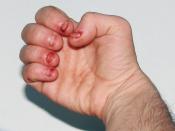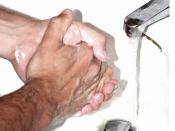Many children and adolescents suffer from numerous emotional and behavioral disorders. Obsessive Compulsive Disorder (OCD) is a common and often debilitating disorder that can affect a student's mental health, academics, and social relationships. Since Obsessive Compulsive Disorder is so prevalent, it is crucial for teachers and other student socialization agents to recognize and develop techniques to help these students cope in school.
It is estimated the prevalence of OCD affects one out of 40 persons. OCD is considered the fourth most common psychiatric disorder, and believed to affect 1 in 200 youngsters; or 3-4 students in an average size elementary school (Adams, Burke, p.2). Obsessive Compulsive Disorder is defined separately as obsessions and compulsions. Obsessions are referred to as "thoughts, impulses, urges, or images that seem to force their way into a person's thinking" (Adams, Burke, p.2). Some of the most common obsessions that children and adolescents with OCD have include "fear of contamination/serious illness, fixation on lucky/unlucky numbers, fear of intruders, need for symmetry or exactness, and excessive doubt" (www.ocdresource.com).
For example, a door handle in the classroom may cause a child to become overly worried about contracting germs. A student may also become upset if their desk is not in order or not clean. Children often ignore or suppress their obsessions. The obsessions often cause the child to experience great discomfort, fear, and/or anxiety. Without help, the child's thoughts may become out of control, and cause them to believe that they are crazy; although they are not (Adams, Burke, p.3).
While obsessions are thoughts that occur in the mind, the compulsions are the acts the person engages in to decrease their anxiety from the obsession. Compulsions are defined as the overt (outward, physical) or covert (internal, mental) rituals that the sufferer engages in to temporarily relieve the...



Great Essay
This is one of the best essays I've ever read. I was only trying to read these essays just to get some helpful tips, but after reading this one I had to use some of this information. This essay was just too good to pass up. Thanks
0 out of 0 people found this comment useful.